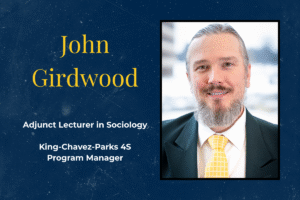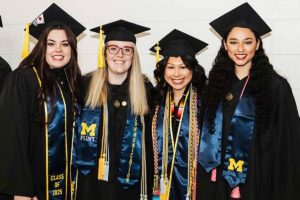“When I sleep, I dream about African literature. It gives me tremendous joy.”
UM-Flint Africana Studies Department professor Dr. Ernest Emenyonu was honored March 4th-7th at the Literary Society of Nigeria’s 2014 International Conference, held in conjunction with the Department of English and Literature at the University of Benin, in Benin City, Nigeria. The theme of the conference was “Whither African Literature”—one perfectly suited to complement the recognition of Dr. Emenyonu.
When asked about his experience of being the conference honoree, Dr. Emenyonu seemed pleased but very modest as he began to describe the world of African literature and his place in it. He started by introducing me to the people featured in large portraits on his office walls, including Wole Soyinka, first African recipient of the Nobel Prize in Literature; Cyprian Ekwensi, author of Jagua Nana (probably Africa’s most controversial novel in the second half of the 20th century); and Chinua Achebe, author of the groundbreaking novel Things Fall Apart (the most widely read African novel today, translated into 65 languages and counting), and its sequel Arrow of God. As he spoke of these men, and how his honors are related to their accomplishments, it was obvious that the work done he’s in the field of African literature is more about personal passion than anything else.
For example, his expertise on Achebe has led to two volumes of edited works, writing introductions and chapters for books, giving keynote addresses at conferences, answering doctoral thesis questions, and speaking to scholars around the globe. In May, 2014, Dr. Emenyonu chaired a panel for a colloquium dedicated to Achebe at Brown University in Providence, Rhode Island. He explained that Achebe is of such note because he was the first African writer to open doors for African authorship and storytelling—to use folk tales and proverbs, honoring the oral traditions of Africa, while writing in the form of a novel.
When asked about the things that excite him in today’s African literature, Dr. Emenyonu spoke of its power, freshness, and the worldwide recognition it is receiving. African writers are being awarded international prizes—from 1986 to 2003, four Africans won the Nobel Prize for Literature: Wole Soyinka (1986), Naguib Mahfouz (1988), Nadine Gordimer (1991), and J.M. Coetzee (2003). Courses are being taught in China, India, South Korea, England, and many other countries. Michigan State University has one of the largest and most productive Africana studies centers in the United States. He sees the prevalence of African Literature in most college catalogs as a symbol of our world’s increasing awareness of the values of multiculturalism and as proof of Africa’s rightful place in a global discussion. He also expressed grave concerns for institutions in which the African experience, especially through literature, is not presently taught: “If you consciously deny your students exposure to what is happening in the world, it is a great disservice. My worry is that multiculturalism shouldn’t just be seen as a mere theoretical idea; it should be taught and practiced.”
I asked about the importance of knowing other cultures through their literature, specifically in the face of media coverage that tends to focus on the violent and negative. Dr. Emenyonu’s response was that literature serves two major functions: to entertain and to impart lessons of social justice and knowledge. “This is when we really need literature that addresses the mind. Writers exist as the social conscience of the world. They are there not to solve problems per se, but to open our eyes to them.” He also spoke on the need for art to serve a purpose of humanity; to be a window into other perspectives, cultures, and worlds in a way that allows us to see differences, recognize similarities, and remember that we are all just humans existing together on the same planet. He spoke of the innocence and hope that lies within children and their ability to simply accept others, whether dissimilar or not.
It is with hope for the reader’s return to such open-mindedness that Dr. Emenyonu has been working on a newer undertaking: books for children. He says, “If this world has a future, it depends on what we put in the minds of our children.” However, children are not the only intended audience, “I also write them for adults—just think how the world could be if we had the minds and hearts of children.” This new project, of course, coincides with several other on-going works including researching, editing journals, and writing a series of short stories each told through a narrator of a different age. This autumn he will also be busy working with a Chinese scholar coming to UM-Flint to work on his PhD that focuses on African literature.
Students attending UM-Flint are also able to work with Dr. Emenyonu, right from their very first semester on campus! He is currently teaching a First Year Experience (FYE) Course titled “Sites and Sounds of Africa.” To learn more about this course visit www.umflint.edu/gened/fye. More information on the Africana department and Dr. Emenyonu can be found at www.umflint.edu/africana.




